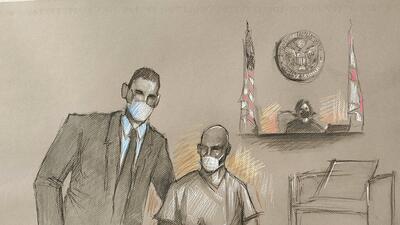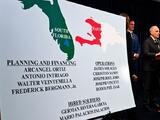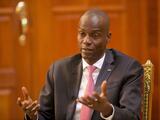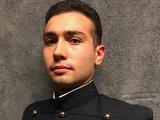Lawyers contest confession of Colombian soldier accused in assassination of Haiti's president

A former Colombian soldier charged in U.S. federal court with conspiracy to murder for his role in the assassination of Haiti’s president, Jovenel Moise, confessed to FBI agents about the plot shortly before he surrendered to U.S. authorities last year and was transported to Miami.
Mario Antonio Palacios pleaded not guilty in April and his lawyers are now asking the judge in the case to block his confession from being used as evidence against him. They argue that agents violated his constitutional Miranda rights by tricking him into making self-incriminating statements.
Palacios is due to go on trial in March with two other defendants accused of conspiracy to murder Moise during a military-style raid by a team of 22 Colombian former soldiers on his official residence in the Haitian capital Port-au-Prince, on the night of July 7, 2021.
Three Colombians died in the raid, while 18 are in custody in Haiti. Palacios was the only one who managed to escape, later making his way to Jamaica.
The assassination has thrown the impoverished nation into turmoil, with no replacement president and a government of questionable legitimacy and heavily armed gangs now controlling large parts of the capital.
Palacios agreed to meet with FBI agents in Jamaica twice in October 2021 before being extradited to the United States in January.
But his Miami lawyers, Alfredo Izaguirre and Joaquin Mendez, argue that Palacios was never properly advised of his constitutional ‘Miranda’ rights that protects suspects of a crime from being compelled to make statements without the presence of his lawyer.
The motion filed late last month asks the judge to “preclude the government from introducing into evidence at trial self-incriminating statements Mr. Palacios made to FBI agents during the course of two interrogations conducted in Jamaica.”
Who is Mario Palacios and why did he go to Haiti?
Palacios was hired by a Miami security firm, CTU Federal Academy, to go to Haiti to provide protection for a would-be presidential candidate who claimed to have an ambitious redevelopment plan for the country backed by wealthy investors.
“He was duped into going to Haiti. To kill the president was not his purpose in going there,” his lawyer, public defender Alfredo Izaguirre, told Univision. “He's not guilty and we're going to fight this case, there's a lot of other people involved in this. The government is targeting him. He's a nobody in this,” he added.
The motion describes Palacios as a helpless “diminutive Colombia national” who had been in hiding in Jamaica for over a month before being questioned by FBI agents.
“He had no prior experience with the U.S. system of justice nor any familiarity with our laws and constitutional guarantees. He had limited formal education and had just retired from the Colombian army after twenty years of service,” the motion states.
“In sum, he was away from the public eye and utterly at the mercy of the surrounding U.S. and local law enforcement officers. His freedom of action was completely curtailed,” the motion adds.
The Miranda rights of non-U.S. citizens on foreign soil is a bit of a gray area in the law. The fifth amendment, or the ‘right to remain silent’, only applies when a person is in custody, said David Weinstein, a former federal prosecutor in Miami. “If the interrogation had taken place here it would be different,” he said.
The lawyers for Palacios argue he was effectively in custody in Jamaica when he entered the hotel room, and therefore his right should apply.
Palacios' confession in a Jamacian hotel
Palacios’ lawyers say he agreed to meet with the FBI on the advice of a friend, Colombian military colonel, identified only as ‘Don Carlos’. It was agreed that the meeting would take place at the US embassy but instead Palacios was escorted to a hotel by Jamaican police where three FBI agents were waiting. After being served breakfast, Palacios sat down for an almost six-hour interrogation.
During the questioning, Palacios initially confessed to being part of a plot to arrest Moise on the basis of what he believed to be a valid arrest warrant, but which turned out to be fabricated. Palacios “repeatedly denied that he had any prior knowledge of a scheme to kill the President,” the motion states. He also insisted that he never fired his weapon in the President’s home.
However, near the end of the interrogation, Palacios asked the agents to pause the recording machine so he could speak privately.
“Palacios finally capitulated and said he had been told of the change of plans (from arrest to murder) the night before the events.”
Palacios was then placed in Jamaican custody for having entered the country illegally and taken to a local jail. He was questioned by the FBI a second time five days later.
Palacias says he was tricked into confessing
During the second meeting, Palacios complained about having been tricked into attending that meeting, saying he had believed he would be treated “like a protected witness”.
The agents pressed him to agree that the first interview was a voluntary interview, to which Palacios did not give a clear answer.
According to the transcript provided to his lawyers in Miami, Palacios gave “no audible response”.
Palacios asked “what will happen to me” when I get to Miami? The agent explained he would “probably” be charged with a murder conspiracy but could receive a light sentence of one to two years because of his cooperation.
“The truth will help you”, one agent told Palacios, according to the motion.
About one hour into the second interrogation, the motion says the agents explained his legal rights, “a modified version of the customary statement of Miranda rights for persons in foreign custody”.
That included the right to have a court-appointed attorney “designated” to him before any questions were
asked. However, the agent added that the possibility of providing a lawyer could be limited in foreign custody to the lack of availability of a U.S. attorney in Jamaica.
Furthermore, the motion states that Palacios “was not specifically asked whether he understood each of his several Miranda rights.
Despite the “unfair” conditions of his interrogation, the lawyers say Palacios signed a waiver form, without putting his initials by each of the rights he was giving up.
He then went on to repeat his previous confession that the original plan to arrest the President changed in the middle of the night before the raid on July 7 when the Colombians were told that the plan was “was to put an end to the President.”
Palacios also ended the second interrogation saying restating that he was willing to cooperate. However, the motion says that he added: “What I am asking is to keep my freedom, brother, so I can raise
my children. That’s what I ask. That’s why I am collaborating.”
Prosecutors have 14 days to respond to the defense motion, but could request more time from the judge.




